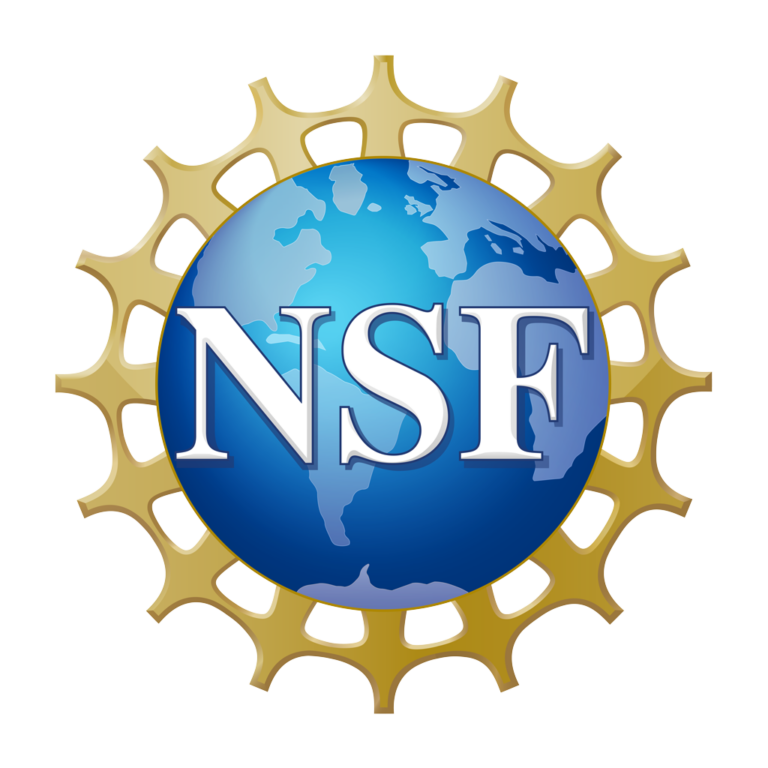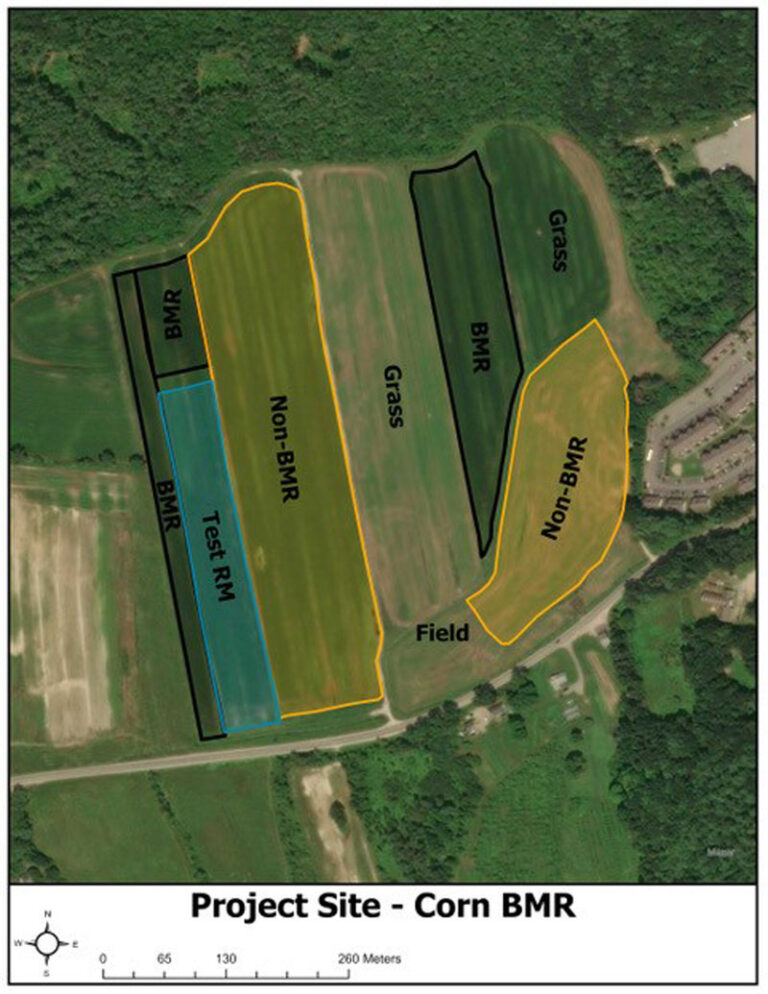Newsletter – December 2020
PRESIDENT’S COLUMN
Advocate for Geography in Austerity
By Amy Lobben
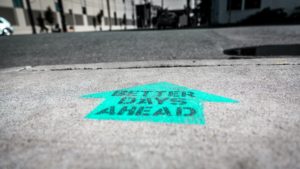 This month I will begin a two-part column on what geography departments can do (and should not do) to advocate for their work in budget talks, which are all the more crucial during the COVID-19 pandemic. These points are largely derived from answers I received from geographers in upper administrative positions at universities.
This month I will begin a two-part column on what geography departments can do (and should not do) to advocate for their work in budget talks, which are all the more crucial during the COVID-19 pandemic. These points are largely derived from answers I received from geographers in upper administrative positions at universities.
If 2020 has taught us nothing else, it is that geography is a crucial discipline for grasping and addressing the dire issues our earth faces. Yet in a year that has demonstrated our value, some of our geography departments continue to struggle for relevancy of university campuses.
ANNUAL MEETING
AAG Annual Meeting Goes Virtual for 2021
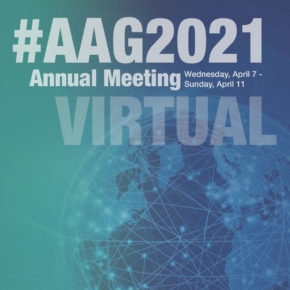
In mid-November, AAG made the difficult but necessary decision to shift the 2021 annual meeting to a completely virtual experience. While we are encouraged by recent news of breakthrough treatment and prevention options for COVID-19, the pandemic’s current trajectory indicates that it won’t be fully resolved by April. A streamlined process is in place to help session and activity organizers bring their programming to the virtual environment, with the assistance of AAG staff. The shift to virtual does not affect any of our existing deadlines for registration, submissions, or session organizing. We want to thank you for being part of the AAG community. Your presence and support mean the world to us.
- Stay up to date on the latest Annual Meeting news
- Register for the 2021 AAG Annual Meeting
- Organized an In-Person Session? Learn More Here
- Poster abstracts due January 29. Submit an abstract
PUBLICATIONS
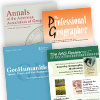 Read the latest issues of all of the AAG journals online:
Read the latest issues of all of the AAG journals online:
• Annals of the American Association of Geographers
• The Professional Geographer
• GeoHumanities
• The AAG Review of Books
New issue of African Geographical Review
 The latest issue of the journal of the Africa Specialty Group of the AAG, the African Geographical Review, has recently been published. Volume 39, Issue 4 (December 2020) is available online for subscribers and members of the Africa Specialty Group. The latest issue contains six articles covering all sub-fields of geography and one article commentary, to enhance the standing of African regional geography, and to promote a better representation of African scholarship.
The latest issue of the journal of the Africa Specialty Group of the AAG, the African Geographical Review, has recently been published. Volume 39, Issue 4 (December 2020) is available online for subscribers and members of the Africa Specialty Group. The latest issue contains six articles covering all sub-fields of geography and one article commentary, to enhance the standing of African regional geography, and to promote a better representation of African scholarship.
ASSOCIATION NEWS
Thank you for your support of the Bridging the Digital Divide Fund
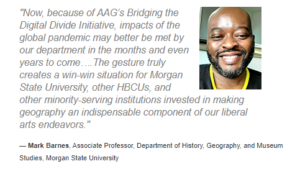 Our thanks to members and supporters who made gifts on Giving Tuesday, December 1st, to AAG’s Bridging the Digital Divide Fund. We received 37 donations, and hope to reach 100 by the end of the month.
Our thanks to members and supporters who made gifts on Giving Tuesday, December 1st, to AAG’s Bridging the Digital Divide Fund. We received 37 donations, and hope to reach 100 by the end of the month.
Bridging the Digital Divide addresses the technology gap that affects too many students–particularly those who are enrolled at minority-serving institutions–who cannot afford personal computers, software, and internet access. The pandemic interfered with the education of many geography students at minority-serving institutions, affecting their ability to complete or even enroll in classes, and causing them to postpone their education as they were unable to connect remotely to the classroom.
Right now, AAG is working with faculty at eight Tribal Colleges and Universities, fourteen Historically Black Colleges and Universities, and one predominantly Black institution to close the technology gap. AAG has provided funds for these geography programs to purchase laptops, software, and internet connections for their students. More than 200 geography students benefited this semester, and we hope to expand the program.
The digital divide existed before COVID-19 and will not go away even as solutions to the pandemic begin to emerge. There’s still time to make a gift. Our collective action will help to leverage industry and foundation partners. No matter the size of your gift, it will make a difference.
Give Now to Bridging the Digital Divide.
Congratulations to Outstanding Graduate Student Papers from Regional Meetings
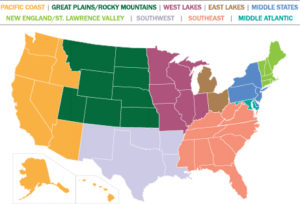 The AAG is proud to announce the Fall 2020 student winners of the AAG Council Award for Outstanding Graduate Student Paper at a Regional Meeting. The annual award, designed to both encourage regional meeting participation and support AAG Annual Meeting attendance, is granted to one student from each division as decided by regional division board members. The winners from each region will present their work in two dedicated sessions at the 2021 AAG Annual Meeting. Congratulations to all of the students who participated!
The AAG is proud to announce the Fall 2020 student winners of the AAG Council Award for Outstanding Graduate Student Paper at a Regional Meeting. The annual award, designed to both encourage regional meeting participation and support AAG Annual Meeting attendance, is granted to one student from each division as decided by regional division board members. The winners from each region will present their work in two dedicated sessions at the 2021 AAG Annual Meeting. Congratulations to all of the students who participated!
Read more about the recipients.
Call for Proposals: AAG Learning Series on Graduate Research Methods in COVID-19
 AAG has issued a new call for proposals, seeking instructors and graduate assistants for its Learning Series for Graduate Students this spring. To support graduate students in adapting in their research during COVID-19, AAG seeks instructors at all levels and in all sectors (professionals lecturers, and faculty from early to advanced career) to develop virtual seminars or workshops.
AAG has issued a new call for proposals, seeking instructors and graduate assistants for its Learning Series for Graduate Students this spring. To support graduate students in adapting in their research during COVID-19, AAG seeks instructors at all levels and in all sectors (professionals lecturers, and faculty from early to advanced career) to develop virtual seminars or workshops.
For workshops and seminars developed by one instructor, AAG will pay the instructor $1,500, and for those developed by more than one instructor, AAG will pay $1,000 per instructor. Proposals with multiple instructors must include clearly defined roles and responsibilities. AAG is also offering a $100 stipend for up to four graduate students to assist instructor(s) during interactive sessions. If selected, the instructor(s) will be able to pick a week between March and June 2021 during which they will offer the seminar or workshop.
The deadline to apply is on or before Thursday, January 14, 2021. See more details and apply here.
Get ready for the 2021 AAG Election

The AAG election will be conducted online again, and voting will take place January 7-28, 2021. Each member who has an email address on record with the AAG will receive a special email with a code that will allow them to sign in to our AAG SimplyVoting website and vote. It’s important to update your email address in your AAG account to ensure you receive the email ballot. The 2021 election slate will be published soon.
POLICY CORNER
2021 Redistricting: How Geographers Can Get Involved

The U.S. Census Bureau is quickly approaching their Dec. 31st deadline to report all population counts in order for states to proceed with the 2021 redistricting process. Due to complications and some irregularities revealed from the 2020 Census, however, the bureau runs a real risk of missing that deadline. These “processing anomalies” have shown some major inconsistencies that could take weeks to rectify. But once disclosed, the state population reports signify the kickoff of next year’s nationwide redistricting.
Geographers have been conducting extensive work on gerrymandering and the redistricting process for years. While these researchers demonstrate great expertise and experience, it is clear that anyone with strong geospatial understanding has something to contribute to the redistricting process. It’s a perspective that redistricting officials sorely need, but often lack. And you do not have to be a GIS expert to get involved.
If you have as little as 15 minutes, you can make an impact. The AAG has compiled the following guide on Four Ways You Can Make an Impact on Gerrymandering and Redistricting.
In the News:
- Congress is voting to extend government funding at current FY20 levels to avert a government shutdown Friday. The extension will last only one week with the goal of finalizing FY21 appropriations before adjourning for the holiday recess.
- Negotiations continue for a COVID relief package that both parties can agree on. A bipartisan group of Senators is working on a compromise bill that comes in at $908 billion. If a deal can be reached, it will be considered as part of the FY21 appropriations package.
- NSF is inviting proposals for new SBE-led initiatives on strengthening infrastructure, broadening participation in entrepreneurship, and enhancing social science capacity at minority-serving institutions.
MEMBER NEWS
Profiles of Professional Geographers
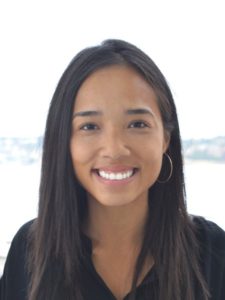
In her position as an Assistant Professor of Epidemiology in the Epidemiology Program, Division of Public Health Sciences, at Fred Hutchinson Cancer Research Center, Trang VoPham investigates environmental risk factors for cancer using geospatial methods to understand how place or location might impact health. VoPham has seen a recent emphasis on geospatial science in jobs advertisements for cancer centers, a sign that geospatial skills can be “highly valuable and useful in careers related to epidemiology and environmental health.”
Learn more about Geography Careers on the recently updated AAG Jobs & Careers website.
December Member Updates
The latest news about AAG Members.
Guo Chen (Michigan State University) received an Outstanding Service Award from AAG-China Geography Specialty Group. This award is presented to the individuals who provided significant services to the China Geography Specialty Group or made important contributions to the advancement of China geography studies.
The China Geography Specialty Group also presented the Student Paper Award to Ronghao Jiang (Hong Kong University), and two Student Travel Awards to Samuel Kay (Ohio State University) and Jiang Chang (Michigan State University). These student awards recognize excellent student papers presented in CGSG-sponsored sessions at the AAG annual meeting, and testify to the hard work invested by students, mentors and institutions supporting them, to generate outstanding research.
RESOURCES AND OPPORTUNITIES
Free Access: 49 Articles on Black Geographies and Racial Justice
In response to the call for more open access to vital scholarship on anti-Blackness and racism, issued by the Black Geographies Specialty Group last June and supported by 37 other AAG Specialty and Affinity Groups in their own letters, AAG and Taylor & Francis are providing free access to 49 articles from our journals through December 31, 2020. AAG acknowledges that this is but one action we must take toward creating a more representative discipline that fully responds to the urgency of confronting and defeating systemic racism, within our discipline and in society at large.
End of Year Deadlines for Grants and Awards, Students and Professionals

As the calendar year comes to a close, several deadlines for grants and awards are approaching. December 31st marks the deadline for multiple student awards such as the AAG Dissertation Research Grants or the Hess Community College Geography Scholarship. Students and professionals are invited to apply for fieldwork related awards through either an AAG Research Grant or the Anne White Fund, both also due on December 31st. Nominations are currently being solicited for a variety of books in geography awards including the Globe Book Award, the Jackson Prize, and the Meridian Book Award, all of which are due on December 31st. Members may also nominate their colleagues for the Glenda Laws Award for social justice and the Harold M. Rose Award for anti-racism research and practice as well as the AAG Wilbanks Prize for Transformational Research in Geography. For colleagues who have made contributions to geography in teaching, consider nominations to the Harm J. de Blij Award for Excellence in Undergraduate Geography Teaching or the AAG E. Willard and Ruby S. Miller Award, both also due December 31st.
See all grants and awards deadlines.
Call for Submissions for you are here

you are here: the journal of creative geography is now accepting submissions for the 2021 issue: bodies & politics. This issue will focus on the significance and political potentials of bodies and embodiment in the current political moment. Please see the full call for submissions on the you are here website. you are here is an annual publication produced by graduate students at the University of Arizona School of Geography, Development, and Environment. The journal seeks to explore geographic themes through poetry, creative writing, maps, photographs, visual art, sonic art, film, and other imaginable genres. you are here encourages submissions from geographers, historians, anthropologists, architects, scientists, writers, artists, activists and anyone else interested in exploring creative geography.
Submissions are due January 12, 2021, by the end of the day. For details of submission guidelines and process, visit the website.
December Kauffman Foundation Early-stage Researcher Professional Development Series
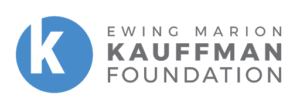
The next virtual Early-Stage Research Professional Development session will take place 1 p.m. CST December 11, 2020 with mentors Jason P. Brown, a Research and Policy Officer in the Economic Research Department of the Federal Reserve Bank of Kansas City and Peter G. Klein, W. W. Caruth Endowed Chair, Professor of Entrepreneurship, and Chair of the Department of Entrepreneurship and Corporate Innovation at Baylor University Hankamer School of Business. This series is open to 15 early-stage researchers to connect with research mentors to discuss research approaches, professional development and the research career trajectory.
Register here for the December session.
IN MEMORIAM
The AAG is saddened to hear of the passing of these colleagues.
Alex Trebek, the Jeopardy! host, passed away on November 8, 2020 at the age of 80 surrounded by family and friends. The broadcaster turned game show host was endeared by millions. Trebek was a lifelong lover of geography and hosted the National Geographic Bee for 25 years from 1989 to 2013. He championed for geographic education and encouraged students to be knowledgeable on the world around them.
Jan Morris, the Welsh historian and travel writer died November 20, 2020 at the age of 94. Morris wrote extensively about history, the details of place, and her life as a transgender woman. Morris covered the first ascent of Mount Everest with Edmund Hillary in 1953 and continued to write about some of the most important moments in history. Her work reinvented travel writing and her book, Conundrum discusses transexuality and opened doors to pioneering gender geographies.
FEATURED ARTICLES
The Advancement of Location Analytics in Business Schools
By Joseph Kerski
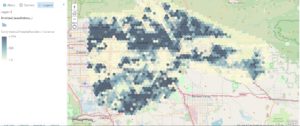
A quiet geographic revolution is occurring on many university and college campuses around the world. Faculty and students in schools and colleges of business are increasingly turning to GIS tools and data in instruction and research. Given that business has always been about “location, location, location,” it makes sense that educators seeking to prepare their students for the workplace are doing so. Yet location analytics, as it is most often called in business schools, took some years to gain a firm foothold. Why is this the case, what are the implications, and how can the geography community assist with these exciting developments?
GEOGRAPHERS IN THE NEWS
- Danny Dorling, Halford Mackinder professor of human geography at Oxford University, discusses the geographies of COVID-19 in England in The Guardian
- Stefan Gössling, a Swedish professor at the Linnaeus University School of Business and Economics produced studies on how global aviation is contributing to the climate crisis and is interviewed by The Guardian
- Marynia Kolak, a health geographer at the University of Chicago claims social determinants are key to understanding the pandemic in The Chicago Maroon
- Jola Ajibade, assistant professor at Portland State University, is interviewed by Yale Environment 360 about how managed retreat programs need to adapt and become equitable amongst rising seas and the increasing risks of living on the world’s coasts.
- Ruth DeFries, an environmental geographer and professor at Columbia University is interviewed in State of the Planet about her new book on adopting strategies from the natural world to solve world problems.
EVENTS CALENDAR
